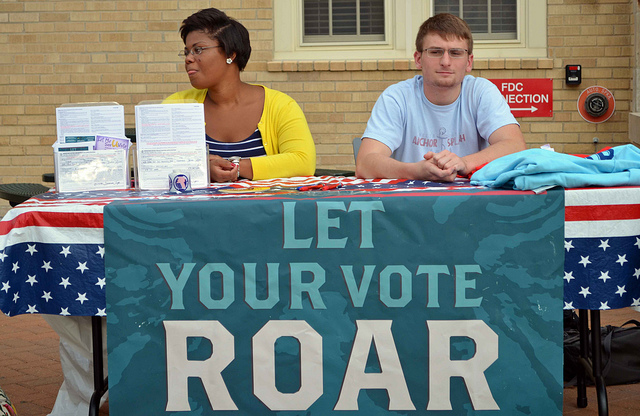“I don’t want everybody to vote.” – Paul Weyrich, conservative activist

Though Democrats have won the popular vote in five of the last six presidential elections, our House of Representatives and many of our state governments are more radically conservative now that at least any time since the Civil Rights movement. We are one Supreme Court Justice from seeing the end of Roe v. Wade and just a few senate seats from a Congress that’s further to the right than the last five GOP nominees for president.
However, there’s a surprisingly easy way to fix the cancerous deficiency in our democracy that has empowered the far right to make massive transfers to the wealth to the rich while shattering the services that enabled the growth of the middle class.
Here’s the problem: One stinking election has stuck our blue nation — and many of its bluest states including Michigan — with bright red governments.
The 2010 midterms, held during the one of the bleakest points of the Great Recession, was a massive landslide for the GOP, though they won 20 million fewer votes than President Obama won just two years later. That one blowout gave Republicans the power to pick their own districts in many states, lodging themselves in majorities that will be nearly impossible to overcome until at least 2022 based on current voting patterns.
The far right’s disproportionate ability to transfer wealth and power to the rich resides entirely in their ability to keep most Americans from voting, especially in non-presidential years, which is why they’re doing everything they can to restrict the right to vote.
Of course, it would be easy to dislodge these conservatives, if people showed up to vote — even in red states.
Think Progress‘ Ben Wrobel and Adam Peck report:
There are 3.7 million unregistered blacks and 4 million unregistered Hispanics and Asian Americans in the “Black Belt” region of the American South. According to Center for American Progress Senior Fellow Ben Jealous, this is an enormous source of untapped political power.
The former national NAACP leader – who oversaw the nation’s largest door-to-door voter registration campaign ahead of the 2012 presidential election – released a report Monday analyzing the latent potential of voters of color in the Black Belt. “True South: Unleashing Democracy 50 Years After Freedom Summer” makes the case that a massive drive to register voters of color could upset the political dynamic in many southern states.
Jealous defines the “Black Belt” as the 13 states stretching from Delaware to Texas, all of which have had a heavy black population since the days of slavery. In recent years the name has taken on a deeper meaning, as black remigration as well as Hispanic and Asian American immigration have resulted in a wholesale reinvention of the region’s demographic profile. Yet the fact remains that in most Black Belt states, progressive candidates generally favored by communities of color rarely win statewide office.
Voter registration drives are essential to transforming the electorate. But how do we fix this problem with our democracy?
There are some pretty simple policy proposals that would improve the situation vastly.
Making voting mandatory and an election day a holiday probably could not become law given the right’s entrenched power and pathological desire to stop people from showing up at the polls. California has already implemented online registration and voter registration is already complying with the federal law that says registration should be part of the Affordable Care Act signup process. But Republicans will do everything they can to make sure this feature isn’t added to federal exchange, which most Americans will use.
There’s a much simpler and dramatic solution.
“When a young person turns 18, that young person should be registered to vote,” Hillary Clinton said during a town hall on CNN this week.
The Clintons have an impressive history of expanding voting and speaking out against the deplorable efforts to limit the right to vote. The National Voter Registration Act of 1993 included the “motor voter” provision that requires states to offer registration when citizens applied for government services. While registration in no way guarantees someone will show up to vote, this law clearly played a huge role increasing Democratic turnout over the last two decades but including millions in the electoral process.
In a post-Citizens United world, where every attempt to limit campaign donations being called an attempt to limit “free speech,” Democrats should fight for the most important expression of speech we have: our votes.
Clinton embracing this issue as part of a presidential campaign gives the idea some hope of becoming law.
But it’s real strength is it’s simplicity for it asks a simple question that every Republican needs to be forced to answer: Why don’t you want every American eligible to vote?
[Image by KOMUnews | Flickr]



